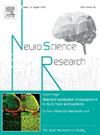Neurobiological mechanisms underlying oxytocin-mediated parental behavior in rodents
IF 2.4
4区 医学
Q3 NEUROSCIENCES
引用次数: 0
Abstract
Parental behavior is essential for mammalian offspring to survive. Because of this significance, elucidating the neurobiological mechanisms that facilitate parental behavior has received strong interest. Decades of studies utilizing pharmacology and molecular biology have revealed that in addition to its facilitatory effects on parturition and lactation, oxytocin (OT) promotes the expression of parental behavior in rodents. Recent studies have also described the modulation of sensory processing by OT and the interaction of the OT system with other brain regions associated with parental behavior. However, the precise neurobiological mechanisms underlying the facilitation of caregiving behaviors by OT remain unclear. In this Review, I summarize the findings from rats and mice with a view toward integrating past and recent progress. I then review recent advances in the understanding of the molecular, cellular, and circuit mechanisms of OT-mediated parental behavior. Based on these observations, I propose a hypothetical model that would explain the mechanisms underlying OT-mediated parental behavior. Finally, I conclude by discussing some major remaining questions and propose potential future research directions.
啮齿动物催产素介导的亲子行为的神经生物学机制
父母的行为对哺乳动物后代的生存至关重要。由于这种重要性,阐明促进父母行为的神经生物学机制受到了强烈关注。数十年来利用药理学和分子生物学进行的研究发现,催产素(OT)除了对分娩和泌乳有促进作用外,还能促进啮齿动物父母行为的表达。最近的研究还描述了催产素对感觉处理的调节作用,以及催产素系统与其他与父母行为相关的脑区的相互作用。然而,OT促进照顾行为的确切神经生物学机制仍不清楚。在这篇综述中,我总结了大鼠和小鼠的研究结果,以期整合过去和最近的进展。然后,我回顾了在理解 OT 介导的父母行为的分子、细胞和回路机制方面的最新进展。基于这些观察结果,我提出了一个假设模型,用以解释 OT 介导的亲子行为的内在机制。最后,我讨论了一些主要的遗留问题,并提出了潜在的未来研究方向。
本文章由计算机程序翻译,如有差异,请以英文原文为准。
求助全文
约1分钟内获得全文
求助全文
来源期刊

Neuroscience Research
医学-神经科学
CiteScore
5.60
自引率
3.40%
发文量
136
审稿时长
28 days
期刊介绍:
The international journal publishing original full-length research articles, short communications, technical notes, and reviews on all aspects of neuroscience
Neuroscience Research is an international journal for high quality articles in all branches of neuroscience, from the molecular to the behavioral levels. The journal is published in collaboration with the Japan Neuroscience Society and is open to all contributors in the world.
 求助内容:
求助内容: 应助结果提醒方式:
应助结果提醒方式:


